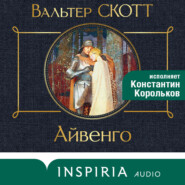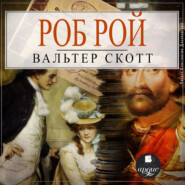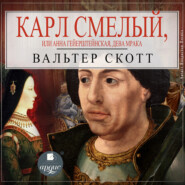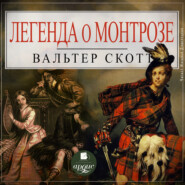По всем вопросам обращайтесь на: info@litportal.ru
(©) 2003-2024.
✖
The Fair Maid of Perth; Or, St. Valentine's Day
Настройки чтения
Размер шрифта
Высота строк
Поля
“Ay – ay,” said the glover, laughing, “we should then have a fine sample of your patient sufferance. Out upon you, Henry, that you will speak so like a knave to one who knows thee so well! You look at Kate, too, as if she did not know that a man in this country must make his hand keep his head, unless he will sleep in slender security. Come – come, beshrew me if thou hast not spoiled as many suits of armour as thou hast made.”
“Why, he would be a bad armourer, father Simon, that could not with his own blow make proof of his own workmanship. If I did not sometimes cleave a helmet, or strike a point through a harness, I should not know what strength of fabric to give them; and might jingle together such pasteboard work as yonder Edinburgh smiths think not shame to put out of their hands.”
“Aha, now would I lay a gold crown thou hast had a quarrel with some Edinburgh ‘burn the wind’ upon that very ground?”
[“Burn the wind,” an old cant term for blacksmith, appears in Burns:
Then burnewin came on like death, At every chaup, etc.]
“A quarrel! no, father,” replied the Perth armourer, “but a measuring of swords with such a one upon St. Leonard’s Crags, for the honour of my bonny city, I confess. Surely you do not think I would quarrel with a brother craftsman?”
“Ah, to a surety, no. But how did your brother craftman come off?”
“Why, as one with a sheet of paper on his bosom might come off from the stroke of a lance; or rather, indeed, he came not off at all, for, when I left him, he was lying in the Hermit’s Lodge daily expecting death, for which Father Gervis said he was in heavenly preparation.”
“Well, any more measuring of weapons?” said the glover.
“Why, truly, I fought an Englishman at Berwick besides, on the old question of the supremacy, as they call it – I am sure you would not have me slack at that debate? – and I had the luck to hurt him on the left knee.”
“Well done for St. Andrew! to it again. Whom next had you to deal with?” said Simon, laughing at the exploits of his pacific friend.
“I fought a Scotchman in the Torwood,” answered Henry Smith, “upon a doubt which was the better swordsman, which, you are aware, could not be known or decided without a trial. The poor fellow lost two fingers.”
“Pretty well for the most peaceful lad in Perth, who never touches a sword but in the way of his profession. Well, anything more to tell us?”
“Little; for the drubbing of a Highlandman is a thing not worth mentioning.”
“For what didst thou drub him, O man of peace?” inquired the glover.
“For nothing that I can remember,” replied the smith, “except his presenting himself on the south side of Stirling Bridge.”
“Well, here is to thee, and thou art welcome to me after all these exploits. Conachar, bestir thee. Let the cans clink, lad, and thou shalt have a cup of the nut brown for thyself, my boy.”
Conachar poured out the good liquor for his master and for Catharine with due observance. But that done, he set the flagon on the table and sat down.
“How now, sirrah! be these your manners? Fill to my guest, the worshipful Master Henry Smith.”
“Master Smith may fill for himself, if he wishes for liquor,” answered the youthful Celt. “The son of my father has demeaned himself enough already for one evening.”
“That’s well crowed for a cockerel,” said Henry; “but thou art so far right, my lad, that the man deserves to die of thirst who will not drink without a cupbearer.”
But his entertainer took not the contumacy of the young apprentice with so much patience. “Now, by my honest word, and by the best glove I ever made,” said Simon, “thou shalt help him with liquor from that cup and flagon, if thee and I are to abide under one roof.”
Conachar arose sullenly upon hearing this threat, and, approaching the smith, who had just taken the tankard in his hand, and was raising it to his head, he contrived to stumble against him and jostle him so awkwardly, that the foaming ale gushed over his face, person, and dress. Good natured as the smith, in spite of his warlike propensities, really was in the utmost degree, his patience failed under such a provocation. He seized the young man’s throat, being the part which came readiest to his grasp, as Conachar arose from the pretended stumble, and pressing it severely as he cast the lad from him, exclaimed: “Had this been in another place, young gallows bird, I had stowed the lugs out of thy head, as I have done to some of thy clan before thee.”
Conachar recovered his feet with the activity of a tiger, and exclaimed: “Never shall you live to make that boast again!” drew a short, sharp knife from his bosom, and, springing on Henry Smith, attempted to plunge it into his body over the collarbone, which must have been a mortal wound. But the object of this violence was so ready to defend himself by striking up the assailant’s hand, that the blow only glanced on the bone, and scarce drew blood. To wrench the dagger from the boy’s hand, and to secure him with a grasp like that of his own iron vice, was, for the powerful smith, the work of a single moment.
Conachar felt himself at once in the absolute power of the formidable antagonist whom he had provoked; he became deadly pale, as he had been the moment before glowing red, and stood mute with shame and fear, until, relieving him from his powerful hold, the smith quietly said: “It is well for thee that thou canst not make me angry; thou art but a boy, and I, a grown man, ought not to have provoked thee. But let this be a warning.”
Conachar stood an instant as if about to reply, and then left the room, ere Simon had collected himself enough to speak. Dorothy was running hither and thither for salves and healing herbs. Catharine had swooned at the sight of the trickling blood.
“Let me depart, father Simon,” said Henry Smith, mournfully, “I might have guessed I should have my old luck, and spread strife and bloodshed where I would wish most to bring peace and happiness. Care not for me. Look to poor Catharine; the fright of such an affray hath killed her, and all through my fault.”
“Thy fault, my son! It was the fault of yon Highland cateran, whom it is my curse to be cumbered with; but he shall go back to his glens tomorrow, or taste the tolbooth of the burgh. An assault upon the life of his master’s guest in his house! It breaks all bonds between us. But let me see to thy wound.”
“Catharine!” repeated the armourer – “look to Catharine.”
“Dorothy will see to her,” said Simon; “surprise and fear kill not; skenes and dirks do. And she is not more the daughter of my blood than thou, my dear Henry, art the son of my affections. Let me see the wound. The skene occle is an ugly weapon in a Highland hand.”
“I mind it no more than the scratch of a wildcat,” said the armourer; “and now that the colour is coming to Catharine’s cheek again, you shall see me a sound man in a moment.”
He turned to a corner in which hung a small mirror, and hastily took from his purse some dry lint to apply to the slight wound he had received. As he unloosed the leathern jacket from his neck and shoulders, the manly and muscular form which they displayed was not more remarkable than the fairness of his skin, where it had not, as in hands and face, been exposed to the effects of rough weather and of his laborious trade. He hastily applied some lint to stop the bleeding; and a little water having removed all other marks of the fray, he buttoned his doublet anew, and turned again to the table, where Catharine, still pale and trembling, was, however, recovered from her fainting fit.
“Would you but grant me your forgiveness for having offended you in the very first hour of my return? The lad was foolish to provoke me, and yet I was more foolish to be provoked by such as he. Your father blames me not, Catharine, and cannot you forgive me?”
“I have no power to forgive,” answered Catharine, “what I have no title to resent. If my father chooses to have his house made the scene of night brawls, I must witness them – I cannot help myself. Perhaps it was wrong in me to faint and interrupt, it may be, the farther progress of a fair fray. My apology is, that I cannot bear the sight of blood.”
“And is this the manner,” said her father, “in which you receive my friend after his long absence? My friend, did I say? Nay, my son. He escapes being murdered by a fellow whom I will tomorrow clear this house of, and you treat him as if he had done wrong in dashing from him the snake which was about to sting him!”
“It is not my part, father,” returned the Maid of Perth, “to decide who had the right or wrong in the present brawl, nor did I see what happened distinctly enough to say which was assailant, or which defender. But sure our friend, Master Henry, will not deny that he lives in a perfect atmosphere of strife, blood, and quarrels. He hears of no swordsman but he envies his reputation, and must needs put his valour to the proof. He sees no brawl but he must strike into the midst of it. Has he friends, he fights with them for love and honour; has he enemies, he fights with them for hatred and revenge. And those men who are neither his friends nor foes, he fights with them because they are on this or that side of a river. His days are days of battle, and, doubtless, he acts them over again in his dreams.”
“Daughter,” said Simon, “your tongue wags too freely. Quarrels and fights are men’s business, not women’s, and it is not maidenly to think or speak of them.”
“But if they are so rudely enacted in our presence,” said Catharine, “it is a little hard to expect us to think or speak of anything else. I will grant you, my father, that this valiant burgess of Perth is one of the best hearted men that draws breath within its walls: that he would walk a hundred yards out of the way rather than step upon a worm; that he would be as loth, in wantonness, to kill a spider as if he were a kinsman to King Robert, of happy memory; that in the last quarrel before his departure he fought with four butchers, to prevent their killing a poor mastiff that had misbehaved in the bull ring, and narrowly escaped the fate of the cur that he was protecting. I will grant you also, that the poor never pass the house of the wealthy armourer but they are relieved with food and alms. But what avails all this, when his sword makes as many starving orphans and mourning widows as his purse relieves?”
“Nay, but, Catharine, hear me but a word before going on with a string of reproaches against my friend, that sound something like sense, while they are, in truth, inconsistent with all we hear and see around us. What,” continued the glover, “do our King and our court, our knights and ladies, our abbots, monks, and priests themselves, so earnestly crowd to see? Is it not to behold the display of chivalry, to witness the gallant actions of brave knights in the tilt and tourney ground, to look upon deeds of honour and glory achieved by arms and bloodshed? What is it these proud knights do, that differs from what our good Henry Gow works out in his sphere? Who ever heard of his abusing his skill and strength to do evil or forward oppression, and who knows not how often it has been employed as that of a champion in the good cause of the burgh? And shouldst not thou, of all women, deem thyself honoured and glorious, that so true a heart and so strong an arm has termed himself thy bachelor? In what do the proudest dames take their loftiest pride, save in the chivalry of their knight; and has the boldest in Scotland done more gallant deeds than my brave son Henry, though but of low degree? Is he not known to Highland and Lowland as the best armourer that ever made sword, and the truest soldier that ever drew one?”
“My dearest father,” answered Catharine, “your words contradict themselves, if you will permit your child to say so. Let us thank God and the good saints that we are in a peaceful rank of life, below the notice of those whose high birth, and yet higher pride, lead them to glory in their bloody works of cruelty, which haughty and lordly men term deeds of chivalry. Your wisdom will allow that it would be absurd in us to prank ourselves in their dainty plumes and splendid garments; why, then, should we imitate their full blown vices? Why should we assume their hard hearted pride and relentless cruelty, to which murder is not only a sport, but a subject of vainglorious triumph? Let those whose rank claims as its right such bloody homage take pride and pleasure in it; we, who have no share in the sacrifice, may the better pity the sufferings of the victim. Let us thank our lowliness, since it secures us from temptation. But forgive me, father, if I have stepped over the limits of my duty, in contradicting the views which you entertain, with so many others, on these subjects.”
“Nay, thou hast even too much talk for me, girl,” said her father, somewhat angrily. “I am but a poor workman, whose best knowledge is to distinguish the left hand glove from the right. But if thou wouldst have my forgiveness, say something of comfort to my poor Henry. There he sits, confounded and dismayed with all the preachment thou hast heaped together; and he, to whom a trumpet sound was like the invitation to a feast, is struck down at the sound of a child’s whistle.”
The armourer, indeed, while he heard the lips that were dearest to him paint his character in such unfavourable colours, had laid his head down on the table, upon his folded arms, in an attitude of the deepest dejection, or almost despair.
“I would to Heaven, my dearest father,” answered Catharine, “that it were in my power to speak comfort to Henry, without betraying the sacred cause of the truths I have just told you. And I may – nay, I must have such a commission,” she continued with something that the earnestness with which she spoke and the extreme beauty of her features caused for the moment to resemble inspiration.
“The truth of Heaven,” she said, in a solemn tone, “was never committed to a tongue, however feeble, but it gave a right to that tongue to announce mercy, while it declared judgment. Arise, Henry – rise up, noble minded, good, and generous, though widely mistaken man. Thy faults are those of this cruel and remorseless age, thy virtues all thine own.”
While she thus spoke, she laid her hand upon the smith’s arm, and extricating it from under his head by a force which, however gentle, he could not resist, she compelled him to raise towards her his manly face, and the eyes into which her expostulations, mingled with other feelings, had summoned tears.
“Weep not,” she said, “or rather, weep on, but weep as those who have hope. Abjure the sins of pride and anger, which most easily beset thee; fling from thee the accursed weapons, to the fatal and murderous use of which thou art so easily tempted.”
“You speak to me in vain, Catharine,” returned the armourer: “I may, indeed, turn monk and retire from the world, but while I live in it I must practise my trade; and while I form armour and weapons for others, I cannot myself withstand the temptation of using them. You would not reproach me as you do, if you knew how inseparably the means by which I gain my bread are connected with that warlike spirit which you impute to me as a fault, though it is the consequence of inevitable necessity. While I strengthen the shield or corselet to withstand wounds, must I not have constantly in remembrance the manner and strength with which they may be dealt; and when I forge the sword, and temper it for war, is it practicable for me to avoid the recollection of its use?”
“Then throw from you, my dear Henry,” said the enthusiastic girl, clasping with both her slender hands the nervous strength and weight of one of the muscular armourer’s, which they raised with difficulty, permitted by its owner, yet scarcely receiving assistance from his volition – “cast from you, I say, the art which is a snare to you. Abjure the fabrication of weapons which can only be useful to abridge human life, already too short for repentance, or to encourage with a feeling of safety those whom fear might otherwise prevent from risking themselves in peril. The art of forming arms, whether offensive or defensive, is alike sinful in one to whose violent and ever vehement disposition the very working upon them proves a sin and a snare. Resign utterly the manufacture of weapons of every description, and deserve the forgiveness of Heaven, by renouncing all that can lead to the sin which most easily besets you.”
“And what,” murmured the armourer, “am I to do for my livelihood, when I have given over the art of forging arms for which Henry of Perth is known from the Tay to the Thames?”
“Your art itself,” said Catharine, “has innocent and laudable resources. If you renounce the forging of swords and bucklers, there remains to you the task of forming the harmless spade, and the honourable as well as useful ploughshare – of those implements which contribute to the support of life, or to its comforts. Thou canst frame locks and bars to defend the property of the weak against the stouthrief and oppression of the strong. Men will still resort to thee, and repay thy honest industry – ”

















